七下Unit 11复习课件
合集下载
人教版英语 七下 Unit11 全单元 复习课件(共32张PPT)

Ⅴ.短文写作
注意:时态
My Dragon Boat Festival was so great. We had so much fun. In the morning, I made zongzi with my mother. After that, I ate zongzi with my brother. It was so delicious. My father watched the boat races on TV. They were so exciting. In the afternoon, I visited my grandparents and I took a lot of great photos. All in all, it was an interesting day.
+5
语法探究:一般过去时态
定义: 表示___过__去_____某个时间或某一段时
间内发生的动作或存在的状态。 时间状语: ___y_e__s_t_e_r_d_a__y_ (昨天),
_la_s__t_y_e__a_r_(去年), __la__s_t_w__e__e_k__ (上周) _th__r_e_e__d_a__y_s__ago (三天前)等。
3.农民 __f_a_r_m__e_r__ 11.油画___p_a_i_n_t_in_g
4.极好的_e_x__c_e_ll_e_n_t 12.令人激动的_e_x__c_it_i_n_g_ 5.乡村_c_o_u_n__tr_y__si_de 13.可爱的__lo_v__e_ly_ 6.昨天_y_e_s_t_e_r_d_a_y_ 14.便宜的 c_h_e_a_p___ 7.担心___w_o_r_r_y___ 15.缓慢的 s_l_o_w____ 8.幸运地__lu_c_k__il_y____ 16.礼物_g__if_t____
人教版英语 七下 Unit11 单元复习 课件(共44张PPT)

5.I ____ an exciting talk show yesterday afternoon. A. watched B. see C. saw D. looked 6.Mrs Hu ____ here yesterday. A. didn’t B. isn’t C. weren’t D. wasn’t
否定句:主语+助动词didn’t+动词原形+其它 I didn’t go to school.
一般疑问句:Did +主语+动词原形+其它? Did you go to school? Yes, I did./No, I didn’t.
巧记动词过去时
动词一般过去时,表示过去发生事; be用was或用were, have,has变had; 谓语动词过去式,过去时间作标志; 一般动词加-ed,若是特殊得硬记。 否定句很简单,主语之后didn’t添; 疑问句也不难,did放在主语前; 如果谓语之前有did,谓语动词需还原; 动词若是was,were,否定其后not添。
后加-ed
play
looked played
以字母e 结尾的动词,live
只加-d
hope
lived hoped
以重读闭音节结尾, stop 末尾只有一个辅音字 plan 母,先双写该辅音字 母,再加-ed
stopped planned
以“ 辅音字母+y ” study 结尾的动词,把y 改 worry 为i,再加-ed
构成规则
例词
1、一般在动词原形末尾加– ed
2、结尾是 e 的动词只加 -- d
3、末尾只有一个辅音字母的 重读闭音节词,先双写这 个辅音字母,再加—ed
人教版 七 下Unit11 11 复习课(PPT29张)
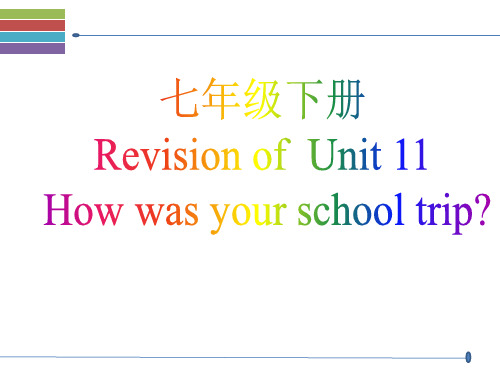
•
17、儿童是中心,教育的措施便围绕 他们而 组织起 来。上 午11时5 5分51 秒上午1 1时55 分11:55: 5121.8. 10
• 2、Our destiny offers not only the cup of despair, but the chalice of opportunity. (Richard Nixon, American President )命运给予我们的不是失望之酒,而是机会之杯。二〇二一年六月十七日2021年6月17日星期四
•
3、Patience is bitter, but its fruit is sweet. (Jean Jacques Rousseau , French thinker)忍耐是痛苦的,但它的果实是甜蜜的。10:516.17.202110:516.17.202110:5110:51:196.17.202110:516.17.2021
I picked some strawberries last weekend. I thought the trip to the farm was very great.
Let’s learn about Carol’s school trip to the farm. How was her school trip? What did she do on the farm?
学习目标
通过本堂课的学习,要求学生: 1. 熟练使用本课的重点单词,短语及句型。 2. 正确使用一般过去时并掌握其用法 3. 从阅读中获取相关信息,并根据材料模仿写作。
目录 contents
核心词汇 重点短语 经典句型 主要语法 阅读及写作
目录 contents
核心词汇
Unit11 复习课件
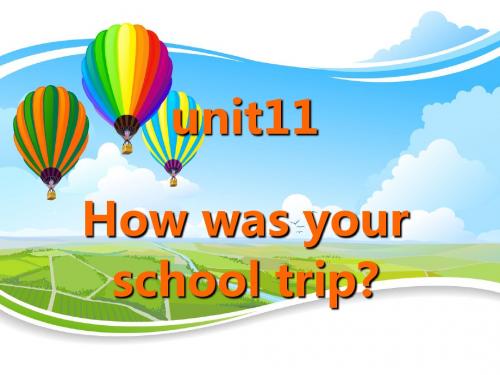
13.使人兴奋的;令人激动的 adj. __________ exciting 14.昂贵的 adj. _________ expensive guide 15.导游;向导 n. _________
反义词:cheap
16.对……感兴趣 ____________ be interested in
短语归纳 1. go for a walk 去散步 2. milk a cow 挤牛奶 3. ride a horse 骑马 4. feed chickens 喂小鸡 5. talk with 与……谈话 6. take photos 拍照 7. quite a lot 相当多 8. show… around 带领……参观
grow -grew, know -knew, throw - threw, blow - blew, draw - drew
6.
中间去e末尾加t
keep-kept, sleep-slept, sweep-swept,
feel-felt, 7. l变d
tell-told, sell-sold
8. e变o, speak-spoke , break-broke 9. 末尾加t,d 11.e变o learn- learnt, hear - heard 10. o变a come-came become-became get-got forget-forgot 12. 结尾d变t send -sent; spend - spent ;
快速回忆所学单词,看谁说得又快又准!
worry 9.担心;担忧 v. _________
worry about 担心……
形容词:lucky
10.幸运地;好运地 adv. _________ luckily 11.博物馆 n. ________ museum painting 12.油画;绘画 n. __________
人教版英语七年级下册 Unit 11 单元巩固与复习 (共28张PPT)

It is very kind of you to help me.
你能帮助我真是太好了。 It is important for us to learn English well.
对我们来说,学好英语很重要。
4. What did the farmer say? 本句是一般过去时的特殊疑问句, 句子的结构是“特殊疑问词+ did + 主语+谓语+其它?”。 特殊疑问词可以根据实际情况选择需要的词, 例如对地点提问用where,对时间提问用when等。 助动词did后面的谓语动词要用原形, did没有人称和数的使用限制。 回答时,要根据问句回答具体的内容。
第二章
词组巩固
学 习 汇 报 ·知 识 书 籍 ·主 题
学校旅行 去散步 挤牛奶 骑马 喂鸡 与农民交谈 照相 问一些问题
school trip go for a walk milk a cow ride a horse feed chickens talk with a farmer take some photos ask some questions
How do you do? 你好! How do you do? 你好! 4)How is it going?/ How is everything going? 用来询问事情进展如何。 例如: How is it going? 情况/进展如何? Very well./ Not too bad./just so so. 很好。/还不坏。/一般吧。
cow [kaʊ] n. 奶牛,母牛;母兽 farmer ['fɑː(r)mə(r)] n.农民;农场主 horse [hɔː(r)s] n. 马 countryside ['kʌntrɪsaɪd]n.乡村;农村 flower ['flaʊə(r)] n.花 sun [sʌn] n.太阳 museum [mjuː'ziəm] n.博物馆 painting ['peɪntɪŋ] n.油画;绘画
你能帮助我真是太好了。 It is important for us to learn English well.
对我们来说,学好英语很重要。
4. What did the farmer say? 本句是一般过去时的特殊疑问句, 句子的结构是“特殊疑问词+ did + 主语+谓语+其它?”。 特殊疑问词可以根据实际情况选择需要的词, 例如对地点提问用where,对时间提问用when等。 助动词did后面的谓语动词要用原形, did没有人称和数的使用限制。 回答时,要根据问句回答具体的内容。
第二章
词组巩固
学 习 汇 报 ·知 识 书 籍 ·主 题
学校旅行 去散步 挤牛奶 骑马 喂鸡 与农民交谈 照相 问一些问题
school trip go for a walk milk a cow ride a horse feed chickens talk with a farmer take some photos ask some questions
How do you do? 你好! How do you do? 你好! 4)How is it going?/ How is everything going? 用来询问事情进展如何。 例如: How is it going? 情况/进展如何? Very well./ Not too bad./just so so. 很好。/还不坏。/一般吧。
cow [kaʊ] n. 奶牛,母牛;母兽 farmer ['fɑː(r)mə(r)] n.农民;农场主 horse [hɔː(r)s] n. 马 countryside ['kʌntrɪsaɪd]n.乡村;农村 flower ['flaʊə(r)] n.花 sun [sʌn] n.太阳 museum [mjuː'ziəm] n.博物馆 painting ['peɪntɪŋ] n.油画;绘画
人教版七年级英语下册Unit 11复习课件( 共17张)
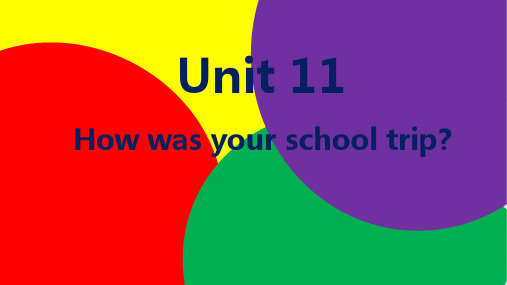
对……了解很 教某人如何
多
做……
礼物商店
在缓慢的火 车上
为某人买某 物
关于
做一个模型 机器人 总之
一点也不
照相
令人兴奋的 一天 真的黑
1. 我们乘火车,那么快到达那里。 2. 在那个博物馆,我们对机器人有了很多了解. 3. 我不知道,他们能和我们一起下象棋。 4. 然后,导游教我们如何制作一个模型机器人。 5. 我为我的父母买了一些可爱的礼物。 6. 我们在六月15日去学校郊游了。 7. 我们参观了科学博物馆,它真的很有趣。 8. 沿途中,我们看见了一些农场和村庄。
4. What did Jim think of the train?What about Helen? Hot and slow. Fast.
5. What did Helen see along the way? Some farms and villages.
6. What is the museum about? Robots.
Look, here are the photos.
A: __D__i_d__ you __s_e__e__ (看见) __a_n__y___ __c__o_w__s__(牛)? __Y__e_s___, I _d__id____. I __s_a_w____(看见) _q__u__i_t_e_ ____a____ ___l_o__t___(相当多).
A: __D__i_d___ you __r_i_d__e__ ___a____ __h_o__r_s_e__(骑马)? B:___N__o___, I _d__i_d_n__’_t. But I _m__i_l_k_e__d____a_____ ___c_o__w____(挤牛奶). A:___D__id___ you _f_e_e__d___ __a_n__y____c_h__i_c_k_e__n__s(喂鸡)? B: Well, I __s_a_w____ _s_o__m__e__ _c_h__ic__k_e__n(看s 见一些鸡) but I _d_i_d__n_’_t_ _f_e__e_d___(没有喂) them. A: _W__h__a__t_ _e__ls__e__ __d__i_d___ you __d__o_____? (你还做其他什么了吗) (和农场主说话) B:We _t_o__o_k___a__w__a_l_k__(散步) _a_r_o__u_n__d___t_h_e__f_a__r_m(在农场四周) antda_lk__e_d___w__i_t_h__t_h__e___.
七年级英语下册unit11 复习课件
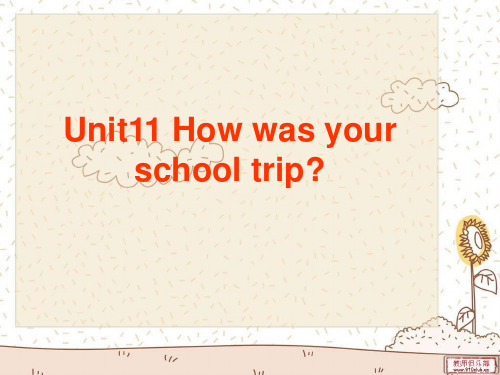
Strucห้องสมุดไป่ตู้ures
Talking about past events:
• • • • • • • • • •
How was your school trip? It was great! How was the weather there? It was sunny. What did you do? I fed the chickens with my grandpa. Did you pick strawberries? Yes ,we did./No, we didn’t. Were the strawberries good? Yes, they were./No, they weren’t.
5. They ate some bread for breakfast. (同上) ______ What ______ did they ______ eat for breakfast?
按照要求完成句子, 每空一词。
1. Peter did his homework last night. (改为否 定句) didn’t ______ do his homework last Peter ______ night. 2. There were some children in the park just now.(变一般疑问句,并进行否定回答) Were there ______ any children in the park —_____ just now? there weren’t —No, ______ _______.
Key phrases
• • • • • • • • • •
• 学校旅行 • 去散步 • 挤牛奶 • 骑马 • 喂鸡 • 与农民交谈 • 照相 • 问问题 • 种苹果 带某人参观某地•
人教版七年级下册unit 11复习(PPT28张)
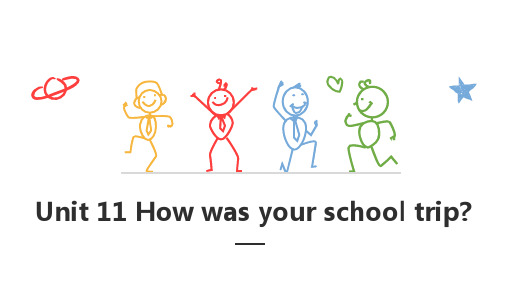
yesterday last …
in+过去的时间
two weeks/months/years ago a few days ago a long time ago How long ago… 多久以前…
yesterday evening/ morning/ afternoon
(拓)the day before yesterday
30 总而言之 all in all
31 根本不 not...at all
Phrases
32 黑暗的
be dark
33 在慢车上 on the slow train
34 很快到那里
get there so fast
Thank you!
→(地道表述)Tom was single.
句式变换
1. Ne Zha was a naughty boy. 2. Ne Zha was not a naughty boy. 3. -Was Ne Zha a naughty boy?
-Yes, he was./ No, he wasn’t. 4. Who was Ne Zha?
Phrases (P206)
Phrases
01 去散步
go for a walk
02 给奶牛挤奶 milk a cow 03 骑马 ride a horse 04 喂鸡 feed chickens
Phrases
05 与一位农民谈话 talk with/ to a farmer
06 看到许多花 see a lot of flowers learn a lot about farming
Phrasesຫໍສະໝຸດ make a model robot 17 制作一个机器人模型
in+过去的时间
two weeks/months/years ago a few days ago a long time ago How long ago… 多久以前…
yesterday evening/ morning/ afternoon
(拓)the day before yesterday
30 总而言之 all in all
31 根本不 not...at all
Phrases
32 黑暗的
be dark
33 在慢车上 on the slow train
34 很快到那里
get there so fast
Thank you!
→(地道表述)Tom was single.
句式变换
1. Ne Zha was a naughty boy. 2. Ne Zha was not a naughty boy. 3. -Was Ne Zha a naughty boy?
-Yes, he was./ No, he wasn’t. 4. Who was Ne Zha?
Phrases (P206)
Phrases
01 去散步
go for a walk
02 给奶牛挤奶 milk a cow 03 骑马 ride a horse 04 喂鸡 feed chickens
Phrases
05 与一位农民谈话 talk with/ to a farmer
06 看到许多花 see a lot of flowers learn a lot about farming
Phrasesຫໍສະໝຸດ make a model robot 17 制作一个机器人模型
Unit 11 单元知识点复习课件 人教版七年级英语下册

5. quite a lot 相当多;许多 ✓ quite 作副词,意为“相当;完全”。 ✓ a lot 后面不能直接跟名词,a lot of 相当于lots of,其后可接可数名词复数或不可数名词。 ✓ quite a lot意为“许多”,如果后面接名词, 则用quite a lot of。
【辨析】quite与very
walk作动词,“走路;散步”,后接地点名 词时,要加上介词to,其后接here,there,home 等地点副词时,不加介词to。
Your home is near the school, so you can walk home. We walk to school every day.
2. milked a cow 给奶牛挤奶 ✓ milk 在此处作动词,意为“挤奶”。
拓展not at all单独使用时的用法: ① 可作为当别人表示感谢的应答语,意为“不
客气;不用谢”。 — Thank you very much. — Not at all.
② 可作为别人称赞或带感谢性质的客套语,意 为“别客气”。 — It’s very kind of you. — Not at all.
含义
总的来说
all in all
总共,合计
句子位置/适用句型
常用于句首 句首或句末
in all at all
根本
常用于否定句中 not (…) at all 根本不
他们总共筹集了一万元。 They raised 10,000 yuan _i_n_a_l_l__.
总的来说,她是一位优秀的老师。 __A_ll__in__a_ll_, she is an excellent teacher.
_________ .
新目标(人教)七年级下册英语单元复习课件 Unit 11 复习课件

Did you learn anything?你学到什么东西了吗?
anything是不定代词,意为“任何东西;任何事物”,常用于否定句
或疑问句中。 【拓展延伸】 ①something常用于肯定句中,在表示委婉的邀请、建议或希望得 到肯定回答或认可的问句中,一般也用something而不用anything。 Could you please give me something to eat?请你给我一些吃的东西 好吗?
feed chickens
talk with a farmer
6.拍照 _t_a_k_e__s_o__m__e__p_h_o__t_o_s_/_p_i_c_t_u_r_e_s___
7.种苹果 8.看星星
____g__r__o____w____a__p____p__l__e__s____________________
gift shop
all in all
25.对……感兴趣 __b__e__in__te__re__s_t_e_d_________ 26.一点也不;根本不 ________________________ 27.令人兴奋的一天 ____n_o__t_.._.a_t__a_l_l __________ 28.太多人 ________________________
91.0摘.去草钓莓鱼____w____a__t__c__h____t__h___e____s__t_a___r_s______________
pick strawberries
go fishing
11.很有意思 ___s_o__m__u_c_h__f_u_n_________ 12.许多 ________________________ 13.爬山 ___q_u__it_e__a__lo__t_(_o_f_)_______ 1145..出在来乡;下c出 ;lim现 在b农_t_村h__e__m_____o___u__n___t__a__i_n___s_____________________
人教版七年级下册unit11复习

人教版七年级下册unit 11复习(PPT28张)
send-sent
spend-spent
人教版七年级下册unit 11复习(PPT28张)
一般过去时 常见标志词
…ago ……以前
yesterday last …
in+过去的时间
人教版七年级下册unit 11复习(PPT28张)
two weeks/months/years ago a few days ago a long time ago How long ago… 多久以前…
3、变aught/ought:
catch-caught teach-taught think-thought bring-brought
人教版七年级下册unit 11复习(PPT28张)
ቤተ መጻሕፍቲ ባይዱ
buy-bought
人教版七年级下册unit 11复习(PPT28张)
不规则动词的过去式 部分记忆规律
4、遇i变a:
yesterday evening/ morning/ afternoon
(拓)the day before yesterday
the week before last
last night
last week
last month
last year
in 1990 in the 18th century
➢ She was here a minute ago.
规则动词过去式的变化规则
1 一般情况→直接加-ed want-_w__a_n_te_d__ play- __p_la_y_e_d__
2 结尾:不发音字母e →直接加-d like-_l_ik_e_d____ hope- __h_o_p_e_d__
send-sent
spend-spent
人教版七年级下册unit 11复习(PPT28张)
一般过去时 常见标志词
…ago ……以前
yesterday last …
in+过去的时间
人教版七年级下册unit 11复习(PPT28张)
two weeks/months/years ago a few days ago a long time ago How long ago… 多久以前…
3、变aught/ought:
catch-caught teach-taught think-thought bring-brought
人教版七年级下册unit 11复习(PPT28张)
ቤተ መጻሕፍቲ ባይዱ
buy-bought
人教版七年级下册unit 11复习(PPT28张)
不规则动词的过去式 部分记忆规律
4、遇i变a:
yesterday evening/ morning/ afternoon
(拓)the day before yesterday
the week before last
last night
last week
last month
last year
in 1990 in the 18th century
➢ She was here a minute ago.
规则动词过去式的变化规则
1 一般情况→直接加-ed want-_w__a_n_te_d__ play- __p_la_y_e_d__
2 结尾:不发音字母e →直接加-d like-_l_ik_e_d____ hope- __h_o_p_e_d__
Unit11复习课件 人教版英语七年级下册
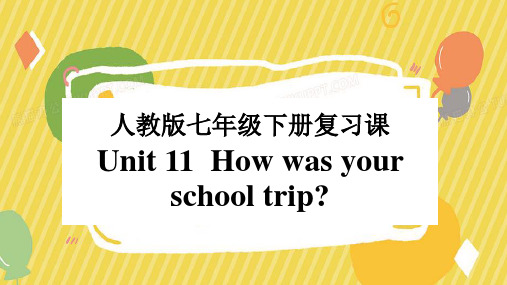
everything为不定代词,“一切”,作主语时,谓语动词用单数 be interested in “对……感兴趣”,主语是人;interesting修饰物。
6. I didn’t like the trip at all. 我一点都不喜欢这次行程。
not… at all “根本不;完全不”。not at all= You’re welcome. “不客气”。
9. 了解
learn about
10. 从……到…… from… to…
11. 种植草莓 grow strawberries
take a walk
talk to sb/ about sth.
12. 采草莓 13.在乡下 14. 去钓鱼 15. 在夜晚
pick strawberries in the countryside go fishing at night
Exercise
1. He has two cups of __m__i_lk__(牛奶)every day. 2. Is there an__y_th_i_n_g__ wrong with your bike? 3. Mary is never late for school. She is an e_x_c_el_l_en__t girl. 4. Tom got up late. _L__u_c_k_il_y_(luck), the bus was also late. 5. The pen is too e_x_c_i_ti_n_g__. I don’t have enough money. 6. The film is very e_x_p_e_n_s_i_v_e(excite). We all like it.
人教版七年级下册复习课
6. I didn’t like the trip at all. 我一点都不喜欢这次行程。
not… at all “根本不;完全不”。not at all= You’re welcome. “不客气”。
9. 了解
learn about
10. 从……到…… from… to…
11. 种植草莓 grow strawberries
take a walk
talk to sb/ about sth.
12. 采草莓 13.在乡下 14. 去钓鱼 15. 在夜晚
pick strawberries in the countryside go fishing at night
Exercise
1. He has two cups of __m__i_lk__(牛奶)every day. 2. Is there an__y_th_i_n_g__ wrong with your bike? 3. Mary is never late for school. She is an e_x_c_el_l_en__t girl. 4. Tom got up late. _L__u_c_k_il_y_(luck), the bus was also late. 5. The pen is too e_x_c_i_ti_n_g__. I don’t have enough money. 6. The film is very e_x_p_e_n_s_i_v_e(excite). We all like it.
人教版七年级下册复习课
初中英语 人教版七年级下册11单元复习课件unit11重点知识课件(共10张)
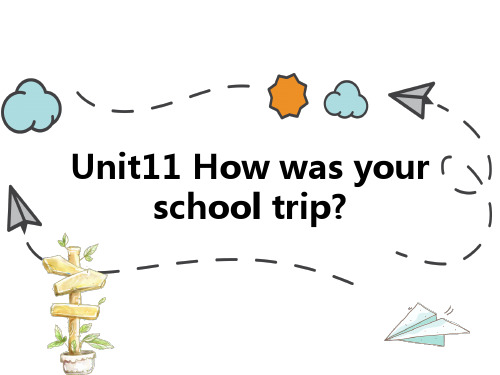
1. school trip
学校旅行
2. go for a walk
去散步
3. milk a cow
挤牛奶
4. ride a horse
骑马
5. feed chickens
喂鸡
6. talk with a farmer 与农民交谈
7. take some photos
照相
8. ask some questions 问一些问题
画画
23. go on a school trip
去旅行
24 visit the science museum
参观科技博物馆
25. how to make a model robot
如制作机器人模型
26.how to do sth
怎么做某事
27. gift shop
礼品店
28. buy sth for sb. 为某人买某物
9. grow apples
种苹果
10. show sb. around
带某人逛某地
11. learn a lot
学到许多
12. pick some strawberries 摘草莓
13. last week
上周
14 in the countryside
在乡村
15. visit my grandparents 拜访我的祖父母
Unit11 How was your school trip?
重点语法:
结构:主语 + 谓语动词的过去式 + 宾语 谈论过去发生的事情用一般过去时态
do/does 的一般过去时态形式:did 例句:Last week I visited my aunt's house.
人教版七年级下册英语:Unit_11复习课件

A: What do you think of Tom and Jerry? B: I ___________ it. A: Do you ________ Tom? B: No, I ____________ him. How about you? A: I ________ him. What do you think of Jerry? B: I ________ him. How about you? A: I ________ him.
根据汉语,补全英语句子。 根据汉语,补全英语句子。 1、“你觉得游戏节目怎样?”“我忍受不了那些东 、 你觉得游戏节目怎样?”“我忍受不了那些东 think of 西What 。” "______do you________ _______game shows?“ “ I can’t stand _______ _____them. " a five-year- 但他会写字、会看书。 2、那是个仅 five-year-old 岁的男孩, 、那是个仅5岁的男孩,但他会写字、会看书。 岁的男孩 read That is only____ ___ _____ boy, but he can write and _____. Taking a walk 3、晚饭后散步对健康有益。 、晚饭后散步对健康有益。 health
everyone William Jones
Loves Likes Doesn't Doesn't Can't mind like stand
Gina Taylor Jack Smith Jerry Green Ann Rice Jeff Ann Rice
Can you fill in the blanks? key ring 1. Jack likes the ________. 2. Jeff can’t stand the scarf. __________ wallet 3. William Jones loves the ________. loves 4. Gina Taylor __________ the watch. doesn’t mind 5. Ann Rice ____________ the watch. sunglasses 6. Jerry likes the __________. belt 7. The coolest thing was the _________.
相关主题
- 1、下载文档前请自行甄别文档内容的完整性,平台不提供额外的编辑、内容补充、找答案等附加服务。
- 2、"仅部分预览"的文档,不可在线预览部分如存在完整性等问题,可反馈申请退款(可完整预览的文档不适用该条件!)。
- 3、如文档侵犯您的权益,请联系客服反馈,我们会尽快为您处理(人工客服工作时间:9:00-18:30)。
—It
.
2. 我们摘了一些苹果带回了家。 We some apples and them home. 2. picked; took 答案: 1. How was; was excellent
3. 昨天他参观了机器人博物馆。 He the robot museum yesterday.
4. 母亲教我如何做早饭。
【语法总结】一般过去时 (一)一般过去时的定义 一般过去时表示过去某个时间发生的动作或存在 的状态或过去经常、反复发生的动作。 (二)一般过去时的时间状语 一般过去时常和表示过去的时间状语连用。例如: yesterday,yesterday morning (afternoon, evening , night) just now,last night(month, year ,winter, …), in 2008, two years ago等。
句型转换
d
本单元以“学校旅行”为话题, 围绕这一话题主要谈论过
去的事情, 学习一般过去时的用法。体现本单元话题及语言综
合运用能力的话题作文“记一次野营 / 野餐 / 郊游 / 旅行”等旅 行日记是各地英语中考书面表达所常考查的。
【习作在线】请根据下表提示, 以“A Great School Trip”为题写 一篇英语短文 , 向你的朋友 介绍我们七年级一班去 人民公园
摘)apples. We also painted some paintings(油画)on the farm.
1. 6. 2. 7. 3. 8. 4. 9 5. 10.
答案: 1. excellent
5. quite 10. pick 6. flowers
2. farm
3. countryside
A. Loudly
B. Clearly
C. Nearly
D. Luckily
【解析】选D。考查副词辨析。loudly大声地; clearly清楚地; nearly几乎; luckily幸运地。句意: 昨天上午我叔叔把身份证丢 了。幸运的是, 下午一位男生找到后把它送还给了他, 所以答 案选D。
Class1, Grade 7 visited Renmin Park. We met at the bus station at seven last Saturday morning and then we went to Renmin Park by bus. It took us about three hours to get there. We took some water and food with them. We went boating and painted some paintings there. We also took many photos. We were tired, but we were very happy.
D. went
【解析】选D。考查动词的时态。由时间状语three years ago 可知as引导的原因状语从句时态用一般过去时, 所以选择答案 D。
2. (2013·济南中考)My uncle lost his ID card yesterday
morning. , a school boy found it and sent it back to him in the afternoon.
Unit11 How was your school trip? 单元复习
复习目标
1、掌握本单元的一些重点词汇。 2、掌握一般过去时。 3、能运用一般过去时写一篇以“学 校旅行”为话题的英语作文。
• for a walk 去散步 2. milk a cow 挤牛奶 3. ride a horse 骑马 4. feed chickens 喂小鸡 5. talk with 与……谈话 6. take photos 拍照 7. quite a lot 相当多 8. show… around 带领……参观
去式的构成如下表:
类
别
构成方法
例
词
一般情况
以不发音字母e结尾 的动词
加-ed
加-d
look-looked
live-lived use-used stop-stopped plan-planned study-studied worry-worried
以重读闭音节结尾 双写这个辅音字母, 的动词, 末尾只有一 再加-ed 个辅音字母 以辅音字母加y结尾 的动词 变y为i再加-ed
(Renmin成 Park) 员校游的情况。 七年级一班的全体师生
出发时间 集合地点 交通方式及旅途时 间 周六早7点 公共汽车站
公共汽车(3小时)
活动项目及要求
带些水和食物; 划船、画画、拍照
累,但很开心
校游感受
要求: 1. 词数: 60个左右(开头已给出, 不计入总词数); 2. 字迹工整, 语言流畅, 表达正确, 逻辑清晰。 A Great School Trip Last weekend we all the teachers and students of Class 1,
2. I did my homework last night. (改为否定句) I _______ 答案: 1. wasn’t my homework last night. 2. didn’t do
3. He went to Beijing with his friends last week. (改为
(乡下). We got there on a
(慢的)train. We
saw 5
(相当)a lot of
6
(花)along the way.
We were
7
(感兴趣的)in 9
8
(一切事物). The farmers 10 (采
taught us how to
( 喂食 )the chickens and
Grade 7 visited_____________________________________
__________________________________________________ __________________________________________________
【思路点拨】 记叙文 。 (1)体裁: _______ 第一人称 。 (2)人称: _________ 一般过去时 。 (3)时态: ___________
【佳作鉴赏】
A Great School Trip
Last weekend we all the teachers and students of
一般疑问句, 并作否定回答)
—______he to Beijing with his friends last
week?
— ,_____ .
4. My mother was happy to see me again. (改为一般
疑问句, 并作肯定回答)
—
—
your mother happy to see you again?
Ⅰ. 词汇速记
1. 相当; 完全(adv. ) 2. 种植(v. )
3. 采摘(v. )
4. 担心; 担忧(v. ) 答案: 1. quite 2. grow 3. pick 4. worry
5. farm(v. &n. )
6. lucky(adj. ) 7. paint(v. )
→
→ →
(n. )农民; 农场主
a cow
a horse chickens
6. in the countryside
7. fire station 8. all in all
答案: 1. milk
2. ride
3. feed
4. interested in
5. 许多
6. 在乡下; 在农村7. 消防站
8. 总的说来
Ⅲ. 句型攻关 1. ——你上周的旅行怎么样? — ——棒极了。 your trip last week?
My mother me cook breakfast last weekend.
5. 他一点也不喜欢这次旅行。
He
like the trip
.
5. didn’t; at all
答案: 3. visited
4. taught; how to
Ⅳ. 词汇串记
My last weekend was 场)in the 3 1 (极好的). We visited a 4 2 (农
【实战演练】 Ⅰ. 用所给动词的适当形式填空 1. It 2. (be)rainy last Sunday. (be)your parents at home last night? (visit)my grandparents with my
3. Last weekend, I parents. 4. Mr. Green
(ride)his bike to work 5 years ago.
5. My father often
young. 答案: 1. was 2. Were
(swim)in this river when he was
3. visited
4. rode
5. swam
Ⅱ. 句型转换 1. She was a dancer 10 years ago. (改为否定句) She a dancer 10 years ago.
9. learn about 了解 10. grow strawberries 种植草莓 11. in the countryside 在乡下 12. go fishing 去钓鱼 13 come out 出来 14.buy sth. for sb. 为某人买某物 15.all in all 总的来说 16.be interested in 对……感兴趣 17.not… at all 根本不……
